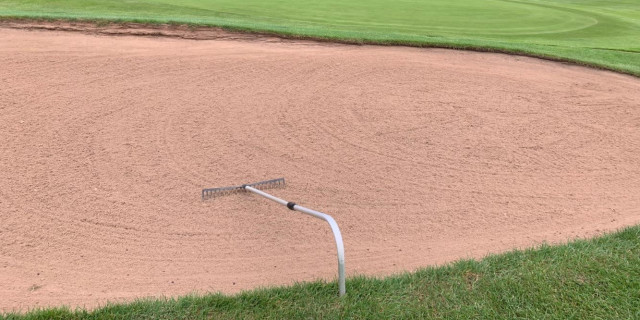
Solutions to Golf's Biggest Frustrations
I recently counted down some of the most irritating golfing annoyances, the niggles that really get my goat on the course. Fun as it was to have a moan, however, it’s no good just criticising: ideally, you need to come up with solutions. Well, let it never be said that I don’t have a store of ideas and that I’m not orientated towards a fix. To counteract the issues that crop up time and again when you’re playing golf, here’s my list of solutions to the sport’s most infuriating pet peeves.
Not Raking Bunkers
There are few forces as powerful for shaping behaviour as peer pressure. And that’s exactly how I propose we fix bad bunker rakers. Things such as an aptly-placed CCTV camera, a reporting system or the threat of a fine may be enough to deter lazy players from shirking their duties. Less draconian (and, to be honest, expensive) solutions might include longer and easier to brandish rakes. Check out, for example, the CMW ‘Rake Easy’ model. With a humped back and a long span, the rake is easy to pick up and use. A bad back becomes an issue of the past and the ease of use should translate into tidier bunkers.

Not Repairing Pitch Marks
The solution to golfers not repairing pitch marks could be similarly surveillance-based, or perhaps the fix resides in better design. Pitch mark repairers are hardly the most inspiring things and, worse, are notoriously easily to misplace in a bag. Jazzier-styled tools might help push the errant golfer into repairing more marks. However, the most effective way of increasing repairs might just be to give them out free to all players in the proshop. The bog-standard metal mark repairers are not exactly premium, and they can be picked up for next to nothing when purchased in bulk.
Featured Content
Not Replacing Divots on Fairways
This is a trickier issue to fix. The thing about divots is that they don’t always remain intact – often the turf just disintegrates with the blow of a club. One possible solution to this, however, may be to provide golfers with complementary divot bags, sacks that can be hooked around a carabiner or a trolley handle which are filled with divot mix. All the player has to do is sprinkle a puff of mixture onto the divot and he’s done. Much easier than gathering up the pieces of a shattered clod!
Not Shouting Fore
How do you solve a problem like ‘fore’? Well, I’ve got two suggestions. One option is that tried and tested favourite, peer pressure. If a golfer in your group doesn’t shout ‘fore’ when he hits a wild ball, call him out on it. He’s sure to get the message pretty quickly. If a friendly rebuke doesn’t quite cut it, however, sterner measures may be in order. Clubs could introduce reporting systems, encouraging players to report those who don’t shout. Less Orwellian, there is also an important role to be played by course marshals. As well as preventing slow play, marshals should also be vigilant in policing ‘fores’.
Putting Bags or Trolleys in Front of the Green
An easy fix to this one: signs or a polite marker ahead of the green. Players are usually pretty good at following on-course signs – take ‘ground under repair’, for example. The problem comes when such signs are in absence. A small plaque or a stake with a message on it would do the trick, but if clubs are worried about damaging the course, they could always just spray paint a polite reminder straight onto the ground. Something like ‘please place your bags close to the next tee before putting out’ would be sufficient to convey the idea. Watch as a badly-placed trolley becomes a thing of the past!
Debating about Flag In or Flag Out
I’ve aired my view on this issue already, and I’m not going to do it again. Roll back the rule change and keep the flag out. Less faff. More speed. More fun.
Slow Play
Due to its prominence on tour, there are a number of issues that have been trialled for slow play. In my view, the most effective of these is likely to be shot clocks, at least when it comes to the tour. Players such as J.B. Holmes and Bryson DeChambeau have shown time and time again that a polite warning is insufficient to make them speed up. You’ve got to hit them where it really matters: shots, and by extension, their wallet. A one shot penalty for any golfer taking more than 60 seconds or so to play their shot would stamp out slow play in a jiffy among the pros. For amateurs, peer pressure is again a solution, as well as stout marshalling and possibly, though I don’t know how this would be orchestrated, fines.
Litter
We fine people for littering in town centres; why not do the same on the golf course? For average people and golfers, the quickest way to change behaviour is through a good hard stick, and there are few sticks more prickly than a monetary fine. Again, a reporting system, whereby players report littering offenders, could help keep the fairways free of rubbish. Fines though, are my overwhelming preference.
No Water Fountains for Refilling Bottles
There’s no way around this one: clubs that are without just need to invest. A water fountain, especially a really nice one, is not going to be available for peanuts. However, there are ways to get value from the purchase. Clubs could theme the fountain as a tribute or monument to a recently deceased member, memorialising a friend of the club. Depending on how much you’re willing to shell out, water taps can even be an attractive addition, an accessory to the sights on the course.
Divots on Tee Boxes
A message in the pro shop before the round should be enough to fix this one, but it’s not going to work without divot boxes. Most serious clubs have these. However, they’re still not as widespread as they should be. It’s a half a dozen (for the par 3s) boxes with divot mix, guys – suck up the cost and invest in them.
Bad Signposting on Courses
Again, a lack of signposts has a simple solution: install them. For many clubs this isn’t an issue – I can count the number of courses I’ve played on where the walk between tees was unclear with one hand – but for the rare times when the flow of the course is ambiguous, a neatly-placed sign is indispensable. It may cost a bit extra, but it’s well worth making these nice – maybe paint them in club colours or emblazon a crest. That way you can turn a potential boorish stake into a trendy addition to the course, a marker of class and style.
Lack of Rubbish Bins
Buy. More. Bins. Easy to say, tougher to do. The word ‘bin’ doesn’t exactly scream glamour and I understand why clubs may be reluctant to dot them around their courses. Let’s be frank, a wheely bin on every tee would make a golf club a laughing stock – we play golf to escape the demands of everyday life, not to be reminded of them! Like a good signpost, however, a bin doesn’t have to be tacky. Many clubs integrate bins into divot boxes, a subtle way of keeping them low-key. Similarly, bins made of wood are also a nice feature, blending seamlessly into the landscape.
Overgrown Rough
Investing in greenkeepers and a good set of mowing equipment is the solution to this problem. Management also has to be onboard though, of course, as without a mandate, greenkeepers are unlikely to just start trimming rough. To be clear, I’m not suggesting that rough is inherently bad, or that whispy long grass is a naff thing – often it can look very stylish! Still, too much rough is an eyesore and a beacon for slow play. Get out the greenies and lop it down!

People who Refuse to Play Faster Golfers Through
Take a deep breath and steady your tea-cup: this one is a bit controversial. As far as I’m concerned, the most effective solution to this issue is simply a blanket ban. Bifurcation of courses would stop slow-playing high handicappers from holding up better players. Tougher tracks should introduce handicap limits, a favourite from long ago, but now defunct and, in my view, necessary to be reinstalled. Less competent players could also have restrictions put on when they can access the course. Morning times might require a handicap of 9 or below to book; the afternoons would be left for everyone else. It’s a tough pill to swallow, but such measures are the only real way to rein in amateur slow play.
What do you think of these proposed solutions? Let us know!
Tags: slow play Pitch Marks Handicaps Divots daily picks Bunkers BIGGA









